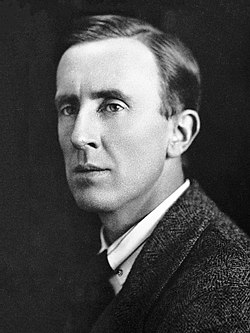J.R.R. Tolkien Quote
Sméagol won't grub for roots and carrotses and - taters. What's taters, precious, eh, what's taters?''Po-ta-toes,' said Sam. 'The Gaffer's delight, and rare good ballast for an empty belly. But you won't find any, so you needn't look. But be good Sméagol and fetch me some herbs, and I'll think better of you. What's more, if you turn over a new leaf, and keep it turned, I'll cook you some taters one of these days. I will: fried fish and chips served by S. Gamgee. You couldn't say no to that.' 'Yes, yes we could. Spoiling nice fish, scorching it. Give me fish , and keep nassty chips!''Oh, you're hopeless,' said Sam. 'Go to sleep!
J.R.R. Tolkien
Sméagol won't grub for roots and carrotses and - taters. What's taters, precious, eh, what's taters?''Po-ta-toes,' said Sam. 'The Gaffer's delight, and rare good ballast for an empty belly. But you won't find any, so you needn't look. But be good Sméagol and fetch me some herbs, and I'll think better of you. What's more, if you turn over a new leaf, and keep it turned, I'll cook you some taters one of these days. I will: fried fish and chips served by S. Gamgee. You couldn't say no to that.' 'Yes, yes we could. Spoiling nice fish, scorching it. Give me fish , and keep nassty chips!''Oh, you're hopeless,' said Sam. 'Go to sleep!
Tags:
sam gamgee
Related Quotes
There was a lot more to that song,' said Sam, 'all about Mordor. I didn’t learn that part, it gave me the shivers. I never thought I should be going that was myself!' 'Going to Mordor! Cried Pippin. '...
J.R.R. Tolkien
Tags:
mordor, peregrin, peregrin took, pippin, pippin took, sam gamgee, samwise, samwise gamgee, strider
About J.R.R. Tolkien
John Ronald Reuel Tolkien (, 3 January 1892 – 2 September 1973) was an English writer and philologist. He was the author of the high fantasy works The Hobbit and The Lord of the Rings.
From 1925 to 1945 Tolkien was the Rawlinson and Bosworth Professor of Anglo-Saxon and a Fellow of Pembroke College, both at the University of Oxford. He then moved within the same university to become the Merton Professor of English Language and Literature and Fellow of Merton College, and held these positions from 1945 until his retirement in 1959. Tolkien was a close friend of C. S. Lewis, a co-member of the informal literary discussion group the Inklings. He was appointed a Commander of the Order of the British Empire by Queen Elizabeth II on 28 March 1972.
After Tolkien's death his son Christopher published a series of works based on his father's extensive notes and unpublished manuscripts, including The Silmarillion. These, together with The Hobbit and The Lord of the Rings, form a connected body of tales, poems, fictional histories, invented languages, and literary essays about a fantasy world called Arda and, within it, Middle-earth. Between 1951 and 1955 Tolkien applied the term legendarium to the larger part of these writings.
While many other authors had published works of fantasy before Tolkien, the tremendous success of The Hobbit and The Lord of the Rings ignited a profound interest in the fantasy genre and ultimately precipitated an avalanche of new fantasy books and authors. As a result he has been popularly identified as the "father" of modern fantasy literature and is widely regarded as one of the most influential authors of all time.
From 1925 to 1945 Tolkien was the Rawlinson and Bosworth Professor of Anglo-Saxon and a Fellow of Pembroke College, both at the University of Oxford. He then moved within the same university to become the Merton Professor of English Language and Literature and Fellow of Merton College, and held these positions from 1945 until his retirement in 1959. Tolkien was a close friend of C. S. Lewis, a co-member of the informal literary discussion group the Inklings. He was appointed a Commander of the Order of the British Empire by Queen Elizabeth II on 28 March 1972.
After Tolkien's death his son Christopher published a series of works based on his father's extensive notes and unpublished manuscripts, including The Silmarillion. These, together with The Hobbit and The Lord of the Rings, form a connected body of tales, poems, fictional histories, invented languages, and literary essays about a fantasy world called Arda and, within it, Middle-earth. Between 1951 and 1955 Tolkien applied the term legendarium to the larger part of these writings.
While many other authors had published works of fantasy before Tolkien, the tremendous success of The Hobbit and The Lord of the Rings ignited a profound interest in the fantasy genre and ultimately precipitated an avalanche of new fantasy books and authors. As a result he has been popularly identified as the "father" of modern fantasy literature and is widely regarded as one of the most influential authors of all time.
